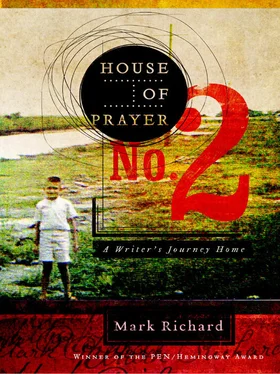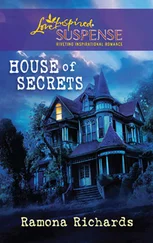IT TAKES YOU FOREVER to write your next book, a novel. You had once asked Gordon what the hardest thing is to write about. Without looking up, he had said the hardest thing to write about is the love one man has for another without it being homoerotic. The only thing you could think of that would approximate that in your life would be the feelings you once felt for two sea captains on whose boats you had once shipped.
You are lost at sea in New York City, headphones on, Bible tract in your back pocket, the seafaring novel roaring in your head, the heaving concrete, headlong black foaming ocean, a pitched deck where men hold on for life in the shadows, a Master somewhere on the upper deck, unseen but seeing, seeing you, no urgency, no destination, no end to the night, you sail under reefed sail, a stranger pulls you by your collar from stepping in front of an express bus on Fifty-seventh Street.
So you rent a beach cottage down on the deserted end of Virginia Beach in winter to finish the novel, and immediately a nor’easter rips off the front of the house and floods the first floor. You send the girl you’ve brought with you back to New York while you stay in the ruins of the place. Melvin comes by and finds you with a shovel and a broom trying to clear your driveway, which the persistent winter wind will cover again overnight. Every day you wake up and shovel and sweep until dark and spend every night at the only bar at that end of the beach where you drink until the bartender drives you home at closing, even though your car is in the parking lot and it’s only two blocks.
The only other people living in your neighborhood of summer rentals are a pretty woman across the street and her three small children. Her husband is a Navy carrier pilot on deployment in the Med. He’s secreted his family here while he’s away because someone has been stalking his wife. You eat when she brings you over plates of food or when Melvin and his wife feed you. At Christmas you buy the lady and her kids across the street a Christmas tree, but you won’t take it in her house. It wouldn’t look right. Once she has a prowler, and she calls you, and you take a pistol over there in the middle of the night and find footprints under a back bedroom window; it could have been teenagers or a hobo. You tell her it’s okay, but you sit up on your porch wrapped in a blanket with a bottle in the dark and keep watch until you fall asleep.
When the husband comes home and his wife tells him you kept an eye on them and wouldn’t come into the house because it wouldn’t look right, he decides he wants to drink a bottle of bourbon with you and you do, and later, when you need a car to drive on book tour, he gives you his 1972 Cadillac Sedan DeVille, gold with brown leather interior, pristine, rebuilt stock-car engine, and a Navy five-shot Smith & Wesson revolver to keep in the seat pocket just in case.
ON YOUR WAY BACK TO NEW YORK to turn in your novel, you stop by your mother’s house. You have Tom Waits’s album Rain Dogs blaring on a boombox as you sprawl on a mattress on a cheap frame after your father looted the house, and as your mother passes the door, she says, No wonder you’re depressed, listening to THAT .
You ask Esquire to let you profile Waits and ask him about his creative process; there is something in his music that calms you even in its most discordant melodies. You do research into music therapy for autistic children, finding that some music reorganizes autistic children’s brain waves. You are also interested in how you can create tension in texts between what meanings the words are conveying on the page and what the sounds of the words themselves are evoking in a reader. Why are certain melodies sad? Melodies without words. You find a theory it all has to do with sound recognition in the most primitive part of our brains and the primal caterwauling of mothers calling their children back into the cave, back into the safety of the fire, the sounds and tones when the children are in sight, nearby but out of sight in the jungle, and, finally, sadly, the grief of when the children having been in the jungle all day and now night is falling, the sound the mother makes when the children are not returning.
You travel to Europe to find Waits, who’s putting up a show called The Black Rider with William Burroughs and Robert Wilson, both of whom you interview, one is a creep and the other is a genius. You spend two weeks in Hamburg, where the show is a hit, and you see The Black Rider several times, and you see snow fall in flakes the largest you’ve ever seen, the size of silver dollars. You follow the show around Europe, but Waits is not available; someone says you should look for him on the Reeperbahn. You stumble around the Reeperbahn and see the prostitutes in the windows, but you’re fearful of all the ice, and you lose your scarf often in the street. You start drinking with the cast and orchestra after the shows and hang out with Robert Wilson but no Waits.
You follow the show to other cities until you are in a small German city somewhere, a grim grey place in winter. A man is demonstrating a carpet cleaner outside of a department store. He has a broom, a donkey, and a crate of carpet cleaner. He lets the donkey shit on a piece of carpet, then he applies the carpet cleaner and sweeps it off, revealing a dirty piece of carpet. You enter one of those deep, deep dark moods, and you stop going to the show, and you hole up in your hotel. There’s nothing but fuel-truck racing on the television. It’s winter and it’s snowing and you’re in deepest, darkest Germany.
One Sunday morning it’s snowing hard again, and you pack your little suitcase and go down to the train station where it’s just you and the ticket agent. You make a promise to yourself that you will get on the first train that comes into the station and ride it to wherever it is going until dark, and you do.
When the train comes into the station, you are the only new passenger, and you sit in an empty car staring out at the fog and snow, and by mid-morning you feel as if the train is climbing but can’t really tell because of the dense fog; you hate to do it, but you ask God for a sign. You somehow feel as if you’ve done your part, by making the pact to get on the first train that arrived in the station, and you have no idea where you’re going.
What a comedian God is! The light begins to change, there is in fact light through the fog, patchy light at first, and you lean close to the window in eager expectation. Nothing, nothing, and then suddenly the train bursts through the tops of the clouds, and you see a jagged brown finger of snow-tipped rock any third grader who has seen You Only Live Twice would recognize as the Alps. A conductor comes through to take your ticket, and you ask if those are the Alps, and he says, Yah, and you forget to ask him where the train is heading because the mountains are staggeringly beautiful in a transfiguring glare of sun on glacial ice.
That night in the Milan train station some kids try to steal the tiny portable typewriter that one of Robert Wilson’s assistants has given you, one that runs on European current, and in the morning you take the first train out of the station going anywhere, and at dark you find yourself in Florence. You disembark and stumble into the nearest four-star hotel, Hotel Diplomat, and you spend a week in Florence, mainly in the Galleria Palatina and the Brancacci Chapel.
It is winter, and there aren’t many other tourists. You go back so often to the Brancacci Chapel that a woman who works there selling tickets scowls at you when you keep showing up to stay for hours, and you can’t help it. Saint Peter resurrecting the boy who was dead for fourteen years, the cripples cured by his passing shadow, the looks on the faces of the neophytes after their baptism, meditative, confounded, stupefied.
Читать дальше













